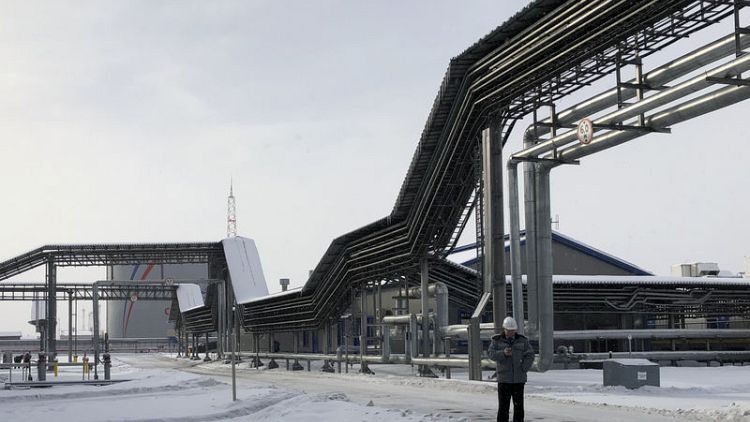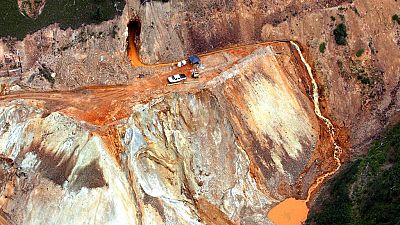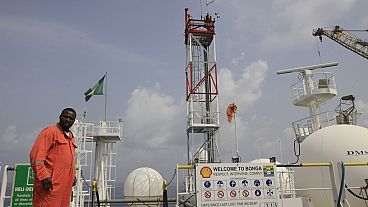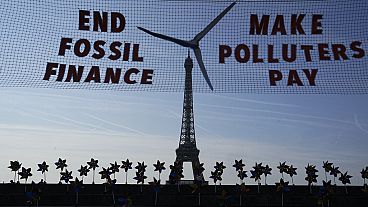By Olga Yagova, Dmitry Zhdannikov and Florence Tan
MOSCOW/LONDON (Reuters) - In the opinion of Russian officials, the oil contamination crisis that disrupted flows from the world's second-largest exporter of crude this spring is long over.
But a closer look at a dozen tankers containing dirty Russian oil suggests that for the buyers, the debacle has a long way to run and will cost them hundreds of millions of dollars.
Two months since buyers discovered Russia was shipping oil contaminated with organic chloride, which is designed to boost output but can destroy refining equipment, less than half of the tainted crude loaded on tankers has found end-users.
More than 1 million tonnes worth around $500 million (392.57 million pounds) remains homeless, zigzagging between Europe and Asia. In China, buyers have refused to take dirty Russian oil, forcing trader Vitol to send a cargo back to Europe.
The Chinese development has not previously been reported.
That means buyers are struggling to place oil even at discounts of $10-15 per barrel - or $10-15 million per regular Suezmax tanker - to the current, regular price of $65 a barrel.
"I’m not willing to risk our equipment just for cheap crude," said an oil trader with a North Asian refinery.
Buyers have also paid millions of dollars in demurrage charges as tankers are stuck with the dirty oil, preventing ship-owners from sending them on new voyages.
Russia has promised to compensate buyers after they file claims post-sale.
"The problem is that this oil is often impossible to sell. So how can I file a claim?," a Russian oil buyer said.
"Sometimes you have a feeling that Russia has moved on from the issue. There was a meeting with buyers at the beginning of June. Since then, we've had no communication whatsoever," another major buyer said.
The Russian Energy Ministry and Transneft did not respond to a request for comment.
CHINA SAYS "NO"
News of the dirty oil broke in late April when buyers from the Baltic port of Ust-Luga and along the Druzhba pipeline to Germany, Poland, Hungary, Slovakia, Ukraine, Belarus and the Czech Republic discovered organic chloride content 10-20 times above normal levels.
After several weeks of debate, Russian pipeline monopoly Transneft pledged to pay compensation to Russian producers such as Rosneft, Surgutneftegas, as well as Kazakhstan, for contaminated oil.
Those producers shall in turn compensate Western buyers including oil traders Vitol, Glencore, Trafigura and oil majors Total, Shell, BP, Eni and PKN Orlen, among others.
Hopes were high that China and India would take a big chunk of dirty oil - as at least 800,000 tonnes began to sail from Europe to Asia - but those have not materialised.
Five trading sources said Chinese customs authorities had told buyers not to take crude with organic chloride content above the Russian standard of 10 parts per million. Some cargoes had as much as 100-200 ppm. The authorities declined to comment.
Suezmax Chios I, fixed by Vitol, has been floating around the Suez for a month, initially set to be sold to an independent Chinese refiner, but is now heading back to Europe with no final buyer, according to traders and ship-tracking data.
Another Vitol Suezmax, the Sonangol Rangel carrying 140,000 tonnes of contaminated Urals, was bought by Chinese independent refiner Bora Group initially for its mainland Dalian plant, but is now heading to storage near Malacca.
A very large crude carrier (VLCC) with 270,000 tonnes, Glencore's Amyntas, also went to Singapore instead of China.
So far, only Sinopec has been allowed to import dirty crude - in the 2-million-barrel VLCC New Comfort - into Ningbo-Zhoushan, eastern China, because it bought the oil in early April before the contamination news broke, trading sources said. The vessel is due to arrive in China on July 12.
Sinopec, Vitol and Glencore declined to comment.
STEEP DEMURRAGE BILLS
In Europe, a limited number of buyers dared to refine the oil including Spain's Repsol, Swedish Preem and Finnish Neste Oil, according to traders and Refinitiv Eikon flows data. They are estimated to have taken 600,000 tonnes.
Dirty oil needs to be diluted before being refined, sometimes one tainted barrel with 20 barrels of clean oil.
"We took a cargo to one of our refineries. It's still being refined and is likely to be for several more months," a trader with an oil major told Reuters.
Meanwhile, at least four cargoes of 100,000 tonnes each are anchored at various European ports and have yet to find a home.
Demurrage costs for the tankers have exceeded $1 million per vessel, four trade sources said.
In one such example, the FSL Shanghai ship chartered by BP has zigzagged between the European ports of Ventspils and Rotterdam since loading in Ust-Luga on May 2.
As of Monday, it still had no buyer and had paid $1.3 million in demurrage charges to date with every new day costing an extra $25,000, trading and shipping sources said.
BP did not respond to a request for comment.
Total's Mendeleev Prospect vessel has been anchored near the Polish port of Gdansk since April 27, while Glencore's Searuby and Searanger vessels are anchored near Turkey's Aliaga and the UK shore.
(Reporting by Olga Yagova in Moscow, Dmitry Zhdannikov in London and Florence Tan in Singapore; Additional reporting by Aizhu Chen and Isabel Wang; Editing by Dale Hudson)



